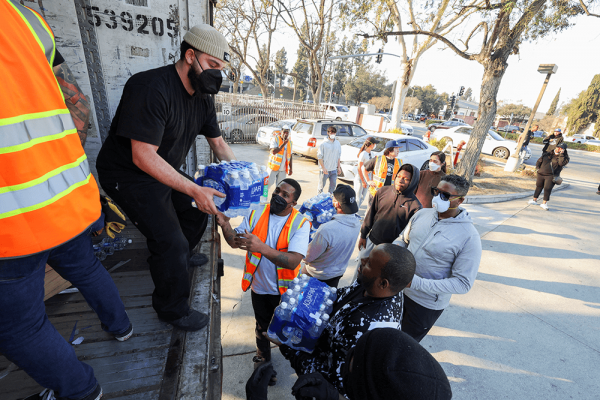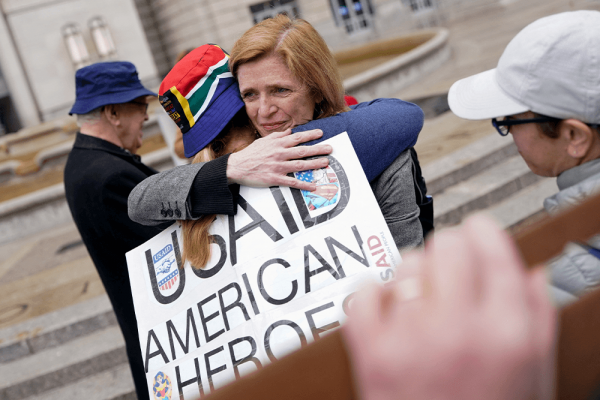For Episcopalians like myself, the Book of Common Prayer is a bridge from Scripture to everyday life. Each time my family observes a baptism in church, we are called upon to renew our commitment to the baptismal covenant, using words from the prayer book.
Celebrant: Will you strive for justice and peace among all people and respect the dignity of every human being?
People: I will, with God’s help.
It has been my fortune to have many chances in my career to think tangibly about what respect for the dignity of every human being entails. One such time was in 2008, when I was the U.S. Ambassador at Large to Combat Human Trafficking. I was in Chennai, India, sitting in a hut belonging to a few Dalits who had been liberated from bonded labor. At the time, only 10,000 people in populous India had been able to take advantage of a law passed 32 years earlier to ban bonded labor and give restitution to those liberated from it. There was a significant gap between law and actuality.
Another time, through work as a State Department official, I saw how institutions failed to help those killed, raped, displaced, or struggling to survive in Sudan.
My career experiences have informed my faith, but have also informed my thinking about policies devoted to human dignity. It’s interesting to me that Christians, Muslims, Jews, and secular universalists alike arrive at a similar place on issues of dignity and development — views that also formed the framework for the Universal Declaration of Human Rights 70 years ago. If you look at where these paths converge — namely, dignity enjoyed — it is worth establishing a definition of dignity as a starting point for dialogue.
One could say dignity has three elements: Agency, that entails people being able to act autonomously and use their gifts and thrive; recognition, that provides a sense of value in the social communities that all people find themselves in; and implementation and institutionalization of that agency and recognition, to ensure dignity’s presence over time.
In dealing with development policy, through all its shortcomings and particulars, it’s important to remember that the value of every human being is simply in being a human, regardless of the group that they come from. Their needs or experience or right to express themselves as a group must be addressed, but their equal value comes from being equally human.
Freedom has two parts: the civic-political and the socio-economic. In other words, freedom requires education as a crucial part of human rights and development, but it requires health care, too. It is important for politically conservative Americans not to over-imbibe the notion that economic and social rights are not the same thing as human rights. “Conservative” President George W. Bush prioritized human trafficking and HIV/AIDS as issues that directly impacted law, poverty, social exclusion, and denial of justice and dignity to vulnerable communities.
Health is a crucial part of development. Consider pandemic disease such as AIDS, tuberculosis (TB) and malaria, for which mortality rates have been halved or more, from 2000 to 2015. Anti-epidemic and other health programs enable development — it is one classic example of how policy can advance dignity enjoyed.
I believe our conversations today about development, aid, and diplomacy warrant a reconsidering of what human dignity means in a time of global uncertainty. So, with no disrespect, I offer these ten commandments for dignity and internatinal development.
Thou shalt not:
- Fail to recognize how faith-based and universalist thinkers converge as key partners in expanding human dignity
- Fail to treat someone as a human being in full
- Create convenient but insidious exceptions for certain people as somehow disposable
- Worship an identity of people over their value as human beings, even while thou shalt properly tailor policy to particular groups based on their particular needs
- Forget that all people are endowed with gifts and potential
- Forget that all people are economic assets to their nations, to empower and cultivate
- Delay or de-prioritize the political and civil liberties people need to actually thrive in the name of fighting poverty first
- Delay, de-prioritize, or deny economic and social rights
- Forget that health is a crucial enabler or dis-enabler of development and dignity
- Neglect implementation and institutionalization of dignity.
Form V of the Prayers of the People in the Book of Common Prayer includes this passage:
For those in positions of public trust, that they may serve justice, and promote the dignity and freedom of every person.
Leaders and stewards of institutions — whether the World Bank, the UN, the Global Fund, governments in the Global South, or the United States — need our prayer and our vigilance to ensure that they are prioritizing dignity for all people.
Got something to say about what you're reading? We value your feedback!






